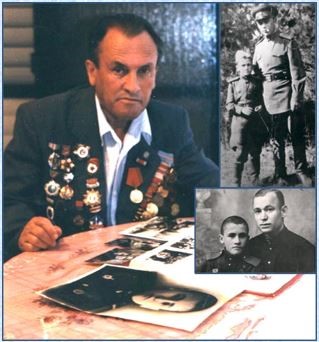Aaron Vernitskii was born in 1936 in Minsk. On June 21, 1941, the day before the German invasion of the Soviet Union, Aaron celebrated his fifth birthday. His father David was an engineer. With the beginning of the Soviet-German war, David was drafted into the Red Army. He was killed in one of the first clashes with the enemy. Aaron, his mother, and elder sister became prisoners in the Minsk ghetto. Anticipating their fate, Aaron's mother Sara made a locket for him to wear, and she inserted into it information about him. On March 2, 1942, when the Germans carried out their third mass murder operation in the Minsk ghetto, the Vernitskiis were taken with many other Jews. Aaron Vernitskii recalled that, on the way to the pits, he cried and asked his mother "Where are we going?" She replied: "Don't be afraid, everything will be alright and don't forget about the locket.[1] During the mass shooting, she pushed him into the pit ahead of her. Her dead body fell on top of him and hid him from the sight of the murderers.
That night Aaron was found alive and pulled out of the pit by a local peasant woman. She took him to her village, but realizing that he was Jewish, did not let him into her home. She gave Aaron food and told him to go to the forest. Thus began a long period of wandering for him. Aaron met a Russian (non-Jewish) boy Misha (Mikhail), a vagabond like himself. This meeting was a major factor in Aaron's survival. Misha was older – he was 12 when they met -- and he became a kind of older brother for Aaron. The boys wandered from village to village, finding food either by begging or by pilfering, spending nights in cowsheds, in railway stations, etc.
In December 1943, a unit of the 75th Guards Rifle Division found the boys sleeping in a haystack in the area of Rechitsa, in southeastern Belorussia. The soldiers took them to their division, washed the boys, burned their lice-filled clothing, and fed them. Then they sent them for medical treatment. After the hospital, the boys were supposed to be sent to an orphanage, but more experienced Misha cautioned Aaron not to agree. Not only was life in wartime orphanages brutal and the weak and still sick Aaron would be beaten there by other boys but, if they discovered that he was Jewish, his fate would be even more miserable. So Misha and Aaron boys expressed their desire to stay with the division as "sons of the regiment." In January 1944, they were "enrolled" in the division as its youngest "soldiers." Aaron received a uniform and even a Browning pistol and the head of the political department of the division taught him reading and writing.
The boys fulfilled auxiliary functions in the division: they were couriers, helped out at the field kitchen, delivered food to the trenches, unpacked artillery shells, helped the communication men, etc. Aaron recalled "They tried not to send us to the front, we had enough work [without that], but sometimes we did have to [go to the front]: to unwind the communications coils, to crawl under fire – where an adult does not fit, the boys helped out".
The 75th Division, with the two boys, fought in the Baltics, Poland, and Germany. In Poland, in the winter of 1945, Misha was killed when an enemy shell hit their bunker; Aaron was only shell shocked. For his "participation" in the war Aaron was awarded three medals -- "For the Liberation of Warsaw," "For the Capture of Berlin," and "For the Victory over Fascist Germany." In May 1945, when he was in Berlin, like adult Red Army soldiers did, he left an inscription on the walls of the Reichstag building. The 9-year-old Aaron wrote: "Mommy, we took revenge. Arik [a diminutive of Aaron]."
After the war, Aaron Vernitskii dreamed of becoming an army musician and even studied with that goal. However, in 1956 he was dismissed from the army due to several diseases that were, most likely, consequences of his wartime year-and-a-half wanderings during the war. After that he worked with children – first as a pedagogue, then in Crimea as the director of institutions for children.
In 1997, Aaron Vernitskii left the USSR and settled in Israel.
[1] Aaron Vernitskii's autobiography, For an abridged version see in: Maks Privler et al., Izrailskii Simvolicheskii Batalion iunykh bortsov s natsizmom im. Itskhaka Rabina, 1st issue, pp. 40-42.







